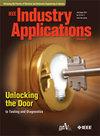基于多智能体深度强化学习的氢储能系统参与分散电压控制
IF 4.2
2区 工程技术
Q2 ENGINEERING, ELECTRICAL & ELECTRONIC
引用次数: 0
摘要
随着电力电子技术的发展,智能逆变器和储能系统被逐步应用于有源配电网的电压调节。本文将氢储能系统(HESS)纳入配电网电压控制,提出了一种配电网电压协同控制框架。首先,考虑到不同稳压装置的特性,提出了一个双时间尺度的电压控制问题。对HESS进行了精确建模,并将其引入到快速时间尺度中。为了实现该问题的去中心化和高效的解决方案,我们将其重新表述为双时间尺度马尔可夫博弈,然后提出了一种改进的多智能体软actor-critic (MASAC)算法来解决该问题。具体来说,在MASAC算法中引入优先体验重放(PER-MASAC),增强了训练过程的稳定性,提高了控制性能。在改进的IEEE 33总线配电系统上对所提出的电压控制框架进行了测试。仿真结果表明,该方法可以有效地缓解电压波动,减少网络损耗,避免HESS的运行违规。本文章由计算机程序翻译,如有差异,请以英文原文为准。
Hydrogen Energy Storage System Participated Decentralized Voltage Control With Multi-Agent Deep Reinforcement Learning Method
With the development of power electronic technology, smart inverters and energy storage systems are progressively employed for voltage regulation in active distribution networks (ADNs). In this article, we incorporate hydrogen energy storage system (HESS) into distribution network voltage control and propose a cooperated voltage control framework. At first, we formulate a two-timescale voltage control problem considering the characteristics of different voltage regulation devices. HESS is accurately modeled and introduced into the fast timescale. To achieve a decentralized and efficient solution to this problem, we reformulate it as a two-timescale Markov games and then propose a modified multi-agent soft actor-critic (MASAC) algorithm to solve it. Specifically, the prioritized experience replay is introduced into MASAC algorithm, which is called PER-MASAC, to enhance the training process stability and improve the control performance. The proposed voltage control framework is tested with a modified IEEE 33-bus distribution system. The simulation results demonstrate that it can effectively mitigate the voltage fluctuation, reduce network loss and avoid the operational violation of HESS.
求助全文
通过发布文献求助,成功后即可免费获取论文全文。
去求助
来源期刊

IEEE Transactions on Industry Applications
工程技术-工程:电子与电气
CiteScore
9.90
自引率
9.10%
发文量
747
审稿时长
3.3 months
期刊介绍:
The scope of the IEEE Transactions on Industry Applications includes all scope items of the IEEE Industry Applications Society, that is, the advancement of the theory and practice of electrical and electronic engineering in the development, design, manufacture, and application of electrical systems, apparatus, devices, and controls to the processes and equipment of industry and commerce; the promotion of safe, reliable, and economic installations; industry leadership in energy conservation and environmental, health, and safety issues; the creation of voluntary engineering standards and recommended practices; and the professional development of its membership.
 求助内容:
求助内容: 应助结果提醒方式:
应助结果提醒方式:


